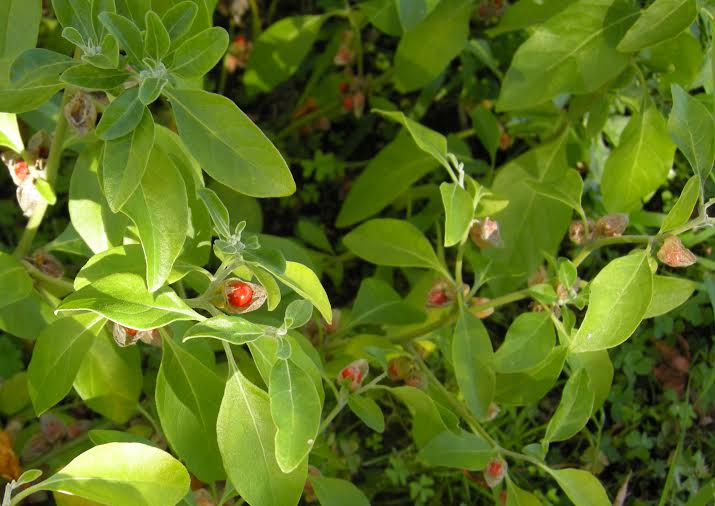
Withania is an attractive plant that thrives in gardens in New Zealand, however the appeal is greatest in the roots of this herb, which have wide ranging healing powers.
Traditional use has inspired scientific studies
Commenly called Ashwagandha, the traditional use of Withania somnifera which dates back over thousands of years in Ayurvedic medicine in India, has shown it has wide healing powers.
Traditional uses of Withania, including its use to alleviate fatigue, rejuventate the body, improve physical and mental health, and increase longevity [1, 2], has inspired recent scientific studies. These have explored the way it works, and demonstrated its effectiveness today.
Protective at times of Stress
Thirty years ago researchers began to demonstrate Withania was able to protect the body at times of stress [1] – helping to prevent stomach ulcers, support the adrenal glands and help prevent depletion of vitamin C [3]. Stress increases our need for vitamin C, as we typically use more when we have physical or mental stress.
Antioxidant & anti-inflammatory
Now more research shows it is an antioxidant, which protects the cells in the body. It contains substances which have anti-inflammatory, antitumor, anti-stress actions, and support the immune system and help rejuninate the body [4, 2].
No apparent side-effects
Safety of any substance, whether it is a food or herb should always be a priority. There appears to be no side effects from Withania according to research [4]. However always take care and only use herbs at the dose recommended or prescribed.
Supportive during Chemotherapy
In the last few years Withania has been shown to help support people who are undergoing Chemotherapy [5, 2]. Withania helps protect blood cells, and can help chemotherapy drugs to destroy cancer cells. In a sudy of fifty women having chemotherapy for breast cancer those treated with Withania root and chemotherapy had less fatigue, and survived longer than those with chemotherapy alone [5]. A similar study of 100 people with breast cancer showed similar results [2].
Withania improves cholesterol
Withania can reduce cholesterol, increase the HDL ”good cholesterol”, and reduce the LDL “bad cholesterol” [6, 7]. It is also used to reduce destructive high blood sugar levels [8, 9].
Helps nervous system disorders
Withania also helps people with nervous system disorders, such as epilepsy, stress, Parkinson's & Alzheimer's disorders, and may be used in the management of drug addiction [1].
Supports people taking anti-psychotic medicines
People who take anti-psychotic medication are more likely to have high blood fats and high blood sugar levels.
Withania has been used to support people taking anti-psychotic medicines to lower blood fats and blood sugar levels [8]. Another side effect of anti-psychotic medicines involves unusual movements of the tongue, and Withania may also help reduce these too [10].
You may be forgiven for thinking that simply taking Withania will heal all your health problems, however, it is important to ensure you also have the optimum nutrition, exercise and relaxation, and seek advice about other herbs which if combined with Withania have a synergetic effect, making every herb in your individual remedy work even more effectively [11].
Contact Bay Health Clinic today to find out more about herbal medicine or to book your Naturopathic consultation; call 07 571 3226 or email us: ask@bayhealth.nz
Original Article July 2014
Copyright Jaine Kirtley
References
1. Kulkarni SK, Dhir A: Withania somnifera: An Indian ginseng. Progress in Neuro-Psychopharmacology and Biological Psychiatry 2008, 32:1093-1105. http://www.sciencedirect.com/science/article/pii/S0278584607003405
2. Biswal BM, Sulaiman SA, Ismail HC, Zakaria H, Musa KI: Effect of Withania somnifera (Ashwagandha) on the Development of Chemotherapy-Induced Fatigue and Quality of Life in Breast Cancer Patients. Integrative Cancer Therapies 2012. http://ict.sagepub.com/content/early/2012/11/07/1534735412464551.abstract
3. Singh N, Nath R, Lata A, Singh SP, Kohli RP, Bhargava KP: Withania Somnifera (Ashwagandha), a Rejuvenating Herbal Drug Which Enhances Survival During Stress (an Adaptogen). Pharmaceutical Biology 1982, 20:29-35. http://informahealthcare.com/doi/abs/10.3109/13880208209083282
4. Alam N, Hossain M, Khalil M, Moniruzzaman M, Sulaiman S, Gan S: Recent advances in elucidating the biological properties of Withania somnifera; and its potential role in health benefits. Phytochemistry Reviews 2011:1-16. http://dx.doi.org/10.1007/s11101-011-9221-5
5. Biswal BM, Sulaiman AM, Ismail HC, Zakaria H, Jalil Abdul MI, Muhammad KI: AOS14 Phase II clinical study of combination chemotherapy with herb Withania somnifera (ashwagandha) in breast cancer. European journal of cancer (Oxford, England : 1990) 2012, 48:S8-S9. http://www.sciencedirect.com/science/article/pii/S0959804912001682
6. Hemalatha S, Wahi AK, Singh PN, Chansouria JPN: Hypolipidemic activity of aqueous extract of Withania coagulans Dunal in albino rats. Phytotherapy Research 2006, 20:614-617. http://dx.doi.org/10.1002/ptr.1916
7. Visavadiya NP, Narasimhacharya AVRL: Hypocholesteremic and antioxidant effects of Withania somnifera (Dunal) in hypercholesteremic rats. Phytomedicine 2007, 14:136-142. http://www.sciencedirect.com/science/article/pii/S0944711306000511
9. Andallu B, Radhika B: Hypoglycemic, diuretic and hypocholesterolemic effect of winter cherry (Withania somnifera, Dunal) root. Indian J Exp Biol 2000, 38:607-609. http://www.ncbi.nlm.nih.gov/pubmed/11116534
10. Naidu PS, Singh A, Kulkarni SK: Effect of Withania somnifera root extract on haloperidol-induced orofacial dyskinesia: possible mechanisms of action. J Med Food 2003, 6:107-114. http://www.ncbi.nlm.nih.gov/pubmed/12935321
11. Yang Y, Zhang Z, Li S, Ye X, Li X, He K: Synergy effects of herb extracts: Pharmacokinetics and pharmacodynamic basis. Fitoterapia 2014, 92:133-147. http://www.sciencedirect.com/science/article/pii/S0367326X13002840
FIND OUT MORE ABOUT...